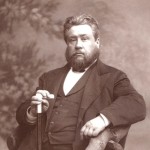Dr. Joel Beeke:
Category Archives: Puritans
Our Love to God is a Sign of His Love to us
 I guess it is a lot like our own day. Go into a Christian bookstore today and the resources found there can be excellent, very good, very bad, extremely bad or sometimes even downright heretical. Voddie Baucham was right when he commented, “There ought to be a sign posted in every Christian bookstore that reads, ‘The views expressed in these books do not necessarily express the views of our Lord and Savior Jesus Christ.’”
I guess it is a lot like our own day. Go into a Christian bookstore today and the resources found there can be excellent, very good, very bad, extremely bad or sometimes even downright heretical. Voddie Baucham was right when he commented, “There ought to be a sign posted in every Christian bookstore that reads, ‘The views expressed in these books do not necessarily express the views of our Lord and Savior Jesus Christ.’”
Yet, we sift and sort through the material on the Christian bookstore shelves and often find something immensely helpful to us, as well as materials we would wish to put into the hands of others.
While no author today is writing Scripture, when we find an author who can be trusted we tend to return to them again and again because they are faithful guides in helping us to understand God’s word. Each of these are gifts of the Ascended Lord Jesus to His body (Eph. 4:7-16). Of course, everything they say or write should ALWAYS be tested by the God-breathed Scripture. Scripture alone is the word of God. Indeed, the best teachers remind us of that. They will say, “where what I say or write disagrees with Scripture, go with the Scripture. That is the infallible guide. I am not.” We know this. We understand this.
And… I write all this to ask you this question, “have you heard of the Puritans?”
I am sure you have. The Puritans were professing Christians who lived after the Protestant Reformation was well under way. Much could be said about their times. It is fair to say that America was founded by the Puritans. While the Puritans were a mixed bag, we owe them a huge debt of gratitude, especially for their stand for the Lord Jesus and His gospel truth.
Like the writings of today, none of these men and women were infallible. The Puritans had their blind spots, and some of them are fairly easy to detect. We have our blind spots too, and these are often harder to see…. but the good thing is this: the blind spots the Puritans had were different blind spots to ours. Understanding this allows us to draw from their writings and when we do, we find that some very gifted brothers and sisters in Christ have left a massive legacy for us.
Here are three helpful quotes in this regard:
“It seems odd, that certain men who talk so much of what the Holy Spirit reveals to themselves, should think so little of what he has revealed to others.” – C. H. Spurgeon, Commenting and Commentaries (London: Passmore & Alabaster, 1876), 1.
“The best way to guard a true interpretation of Scripture, the Reformers insisted, was neither to naively embrace the infallibility of tradition, or the infallibility of the individual, but to recognize the communal interpretation of Scripture. The best way to ensure faithfulness to the text is to read it together, not only with the churches of our own time and place, but with the wider ‘communion of saints’ down through the age.” – Michael Horton, “What Still Keeps Us Apart?
“Tradition is the fruit of the Spirit’s teaching activity from the ages as God’s people have sought understanding of Scripture. It is not infallible, but neither is it negligible, and we impoverish ourselves if we disregard it.” – J.I. Packer, “Upholding the Unity of Scripture Today,” JETS 25 (1982): 414
I agree – and I write all this because I would like to introduce you to a Puritan – a man named Thomas Watson.
Was he infallible? No. Certainly not.
 Could he be helpful to us? Yes, for sure. He got a lot of things right and had great insight on many matters. And here is where this becomes helpful to us. When we see what he saw, it allows us to stand on his shoulders, so to speak, so that we can see further than we would have without him… did you catch that? …“further than we would have without him.”
Could he be helpful to us? Yes, for sure. He got a lot of things right and had great insight on many matters. And here is where this becomes helpful to us. When we see what he saw, it allows us to stand on his shoulders, so to speak, so that we can see further than we would have without him… did you catch that? …“further than we would have without him.”
What do we wish to see?
Oh that is easy. We wish to see the glory of our great God; the wonders of the Lord Jesus Christ and the splendor of the gospel.
Oh Lord, by the power and work of God, the Holy Spirit, help us see – truly see!
Let me give you a taste of what I mean by means of the following, an excerpt from Thomas Watson’s book on the Ten Commandments (available for free in ebook, mobi and pdf formats here)
It is an article entitled “7 Visible Signs of our Love for God.” Perhaps you can print this out and either today or over the next few days, read through it. I think you will find it a rich resource in helping you draw near to the Lord this week. Each point made in the article is a meditation on His word. I would say – a deep meditation – on His word.
One warning: There is old English to work through and there may even by times when we need to check with a dictionary in order to understand certain words being used that are very unfamiliar to us… but that’s ok. I believe doing this is worth any effort involved.
My hope is that it will be a blessing to each of you and that you will draw nearer to the Lord through the words that follow. That is my prayer for each of us.
Enjoy!
7 Visible Signs of our Love to God by Thomas Watson
(original source here)
Before all else let us remember, our love to God is a sign of his love to us. ‘We love him because he first loved us.’ I John 4: 19. Continue reading
The Old Puritanic Faith
 “A certain vainglorious party of Pretenders to intellect and culture tell us now that the old Puritanic faith is nearly extinct; there are only a few of us ignorant people who now hold the same truths as John Owen, John Bunyan, Goodwin, and Charnock; but all the elite of the world, those who have all the “sweetness and light” to themselves, the thinkers, the mental gentility have all been sensible enough to give their votes for something more suitable to the times.
“A certain vainglorious party of Pretenders to intellect and culture tell us now that the old Puritanic faith is nearly extinct; there are only a few of us ignorant people who now hold the same truths as John Owen, John Bunyan, Goodwin, and Charnock; but all the elite of the world, those who have all the “sweetness and light” to themselves, the thinkers, the mental gentility have all been sensible enough to give their votes for something more suitable to the times.
In the name of God, we shall show them the difference yet, and by his Spirit He will din their ears with the gospel ram’s horn till they and their Jericho come down in a common ruin. The evangelical doctrine which shook Europe will shake it yet again, and England shall yet know that the self-same truth, for which her martyrs died and for which her Puritans fought on many a well-contested field, shall break the rationalism and ritualism of this land in pieces yet, and all else that standeth in the way of the true gospel of the living God.
We are not afraid nor discouraged, but we cry mightily unto the King that we may once more lift up a shout because of his presence, for then human philosophy shall be ashamed, and old Rome shall know, and all the cubs of the beast of Rome shall know, that the Lord liveth, and his invincible truth shall win the day.”
– Charles Spurgeon
